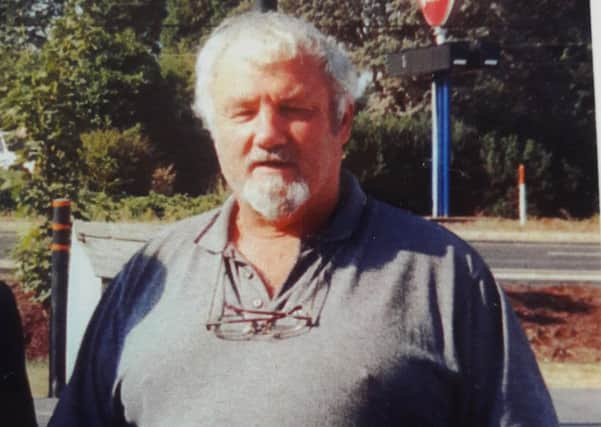Obituary: Stewart Togher, hammer-throwing coach who was an inspiration to Olympic medallists


Scot Stewart Togher who has died in Oregon, aged 80, was a universally-acclaimed hammer throwing coach described by one of his protégés, American 1996 Olympic silver medallist Lance Deal, as “the world’s best hammer coach bar none”.
Another of his star pupils was the Japanese athlete Kujo Murofushi, hammer gold medallist at the 2004 Olympics, who considered Togher’s input to his success invaluable.
Advertisement
Hide AdAdvertisement
Hide AdOver the last 30 years or so he coached most of the top American hammer throwers after leaving Scotland in the early 1980s to join the US Olympic development programme. Soon after crossing the Atlantic, he was appointed throws coach at the University of Oregon in Eugene, a post he held for 15 years and for most of that period was also national US hammer coach.
Prior to leaving Edinburgh, where he was a well known figure at Meadowbank Stadium, he was already an established coach, tutoring among others Olympic hammer finalist Chris Black, Commonwealth Games discus champion Meg Ritchie, and several Scottish champions including shot putter Eric Irvine, multi throws expert Paul Buxton and javelin thrower John Guthrie.
His growing reputation led to athletes coming from abroad for the benefit of his expertise and after a fruitful association with American hammer thrower Andy Bissett, the path was paved for his move to the US where the hammer was his speciality. As a coach, he was hugely knowledgeable, innovative, and constantly searching for improvement not only in his charges but also himself. He had a great eye for the intricacies of the discipline –“he has eyes to know if you’re one inch off ” according to one thrower – and a talent for communication. Although capable of great charm, he had a steely side to him, a combination that worked well for those he trained, with whom he was popular.
A Scottish weightlifting champion in his early 20s, he also competed with modest success in the throws for Edinburgh Southern Harriers and between 1960 and 1976 appeared four times in the top ten of the ranking lists. His best event was the hammer, securing a bronze medal in the Scottish Championships in 1972.
Born in Kirkcaldy to Patrick and Muriel, he was the elder brother of twins Justin and Ruth. Justin himself was an accomplished athlete, representing Scotland several times as a sprinter in the 1960s. Their father was a builder and the family was brought up in Edinburgh’s Prestonfield area. Togher attended James Gillespie’s Boys primary school before going to Portobello High School. A talented youngster, his first claim to fame was as a teenage country dancer being presented to the Queen at the Murrayfield Highland Gathering. An all round sportsman, he showed promise as a footballer and gymnast before strength events took over. This led to a role as an ‘extra’ as a bodyguard in a King’s Theatre production and work as a door steward at a number of Edinburgh’s nightspots such as the Gamp and Chameleon where he enjoyed a well deserved reputation for being able ‘to look after himself.’ Despite the ‘tough guy’ image, by way of contrast, he was also an accomplished classical and jazz pianist.
After two years’ national service at Catterick he began work as a telephone engineer but did not enjoy being indoors and switched to the outdoors as a landscape gardener. This included spells as a groundsman at Edinburgh University and the Royal High School and it was while employed by the university that his interest in the hammer particularly developed through meeting legendary coach Bob Watson, then head groundsman at the university’s Craiglockhart field.
After Watson became ill, Togher took over coaching Chris Black and mentored him to a 7th place in the 1976 Montreal Olympics, an outstanding achievement at a time when Eastern Europeans dominated the event. His coaching took place mostly at Meadowbank where he devised a short intense exercise routine known as the Togher Circuit, popular not only with throwers but also many top sprinters including Allan Wells and George McNeill. Although his lack of formal qualifications hindered progress in the athletics establishment hierarchy, a sports coaching diploma course in 1978 at Dunfermline College of P.E. eased the way somewhat but it was not until he went to the States that he was able to make coaching his livelihood.
Once there the hammer became ‘his magnificent obsession’ according to Lance Deal, who thought Togher often stayed awake at night to devise new coaching drills and satisfy his hunger for knowledge of the event.
Advertisement
Hide AdAdvertisement
Hide AdJust before clinching his silver medal on his final throw in Atlanta, he was inspired by Togher’s final words to him, “it only takes one throw.” The Americans he coached read like a Who’s Who of hammer throwing, among them Jud Logan, Ken Flax, James Parker and Jake Freeman. Murofushi spent several days a month with him in Eugene over the year preceding his success which prompted a Tokyo newspaper to produce a supplement in tribute to Togher’s coaching. As a director of the 2020 Tokyo Games, Murofushi invited him to be his personal guest but sadly that is now not possible.
About ten years ago the Scot bought several acres of land at Pleasant Hill near Eugene where he built a house with splendid views over a river valley and established a hammer throwing centre with a gym alongside, described by one of his athletes as ‘a thrower’s paradise’. This venue, which he named The Sanctuary, was a magnet for hammer throwers whom Togher delighted in instructing in an idyllic environment.
He is survived by sons and daughter Robert, Wendy, Derek and Stewart, from his marriage here to Ann which ended in divorce, and by his partner in Oregon, Kathy Campbell and their daughters Carly and Heather.
JACK DAVIDSON